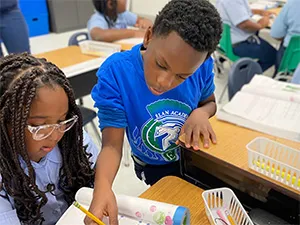About Élan Academy
A classical education for the 21st century
Our Mission
Through a classical curriculum, high-quality instruction, and leadership development, Élan Academy Charter School ensures that all students have the foundation necessary to thrive in secondary school, college, and careers, empowering them to be the leaders of tomorrow.

Classical Education
We stand firm on three concepts - grammar, logic, rhetoric - and three components - structured learning, great Books, spoken language.
Our 21st century approach to learning, joined with a classical curriculum, prepares students to think critically, communicate effectively, and become lifelong learners.
What Makes Us Special
Small Class Sizes
Our intimate class sizes ensure every student receives personalized attention and support.
Two-Teacher Model
Enhanced instruction with two dedicated teachers in every classroom.
Family Engagement
Strong partnerships with families to support student success.
College Preparation
Rigorous academics that prepare students for higher education.
Board of Directors
Meet the dedicated leaders guiding Élan Academy's mission and vision.